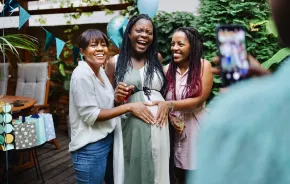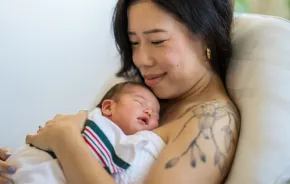
With the birth of my first child quickly approaching, people increasingly ask me one question: Boy or girl?
We know but we’re not telling.
My husband Joe and I learned our baby’s sex at 12 weeks but haven’t told anyone. We simply refer to the baby as “it.” So far, we’ve been met with mostly positive, understanding feedback about our choice to remain as gender neutral as possible as we raise our child.
For those who press for answers, we explain that we believe a person has the right to identify with whatever gender they choose, regardless of their biological sex. We want to make sure we do as much as we can to not hinder that self-identification process for our own child.
That means providing our child as many choices as we can. I carefully chose items for our registry that were neutral colors or that didn’t specify “boy” or “girl” in the description. As our child grows, we agree they’ll have total freedom to choose what they wear and what they play with.
This decision was strongly influenced by my own childhood. As a girl, I played with My Little Ponies and Barbies as well as Legos and video games. I wore my older brother’s JNCO pants and oversized t-shirts when I didn’t feel like layered tank tops and short shorts. I started driving ATVs at age 8. I also took ballet.
Half of surveyed millennials believe that gender exists on a spectrum and that 'some people fall outside conventional categories.'
I was a mishmash of gender stereotypes because my parents allowed me to be. As a child, I was never told I couldn’t do or wear something because they were “boy things.” I wasn’t treated like a delicate flower. My closet wasn’t full of dresses or predominantly pink and purple.
I want to do the same as a parent. I don’t want my child to feel trepidation in choosing clothes, toys, hobbies or eventually a profession that doesn’t “align” with their sex.
Will a baby even notice? you ask. The short answer: Yes.
“Infant brains are so malleable that small differences at birth become amplified over time, as parents, teachers, peers — and the culture at large — unwittingly reinforce gender stereotypes,” explains neuroscientist Dr. Lise Eliot, author of “Pink Brain, Blue Brain.”
This applies not to just how we refer to a child but how they dress. “[Gender-specific clothing] encourages very young children — as young as 2 — to judge and interact with others in highly stereotyped ways,” says Jo B. Paoletti, professor and director of undergraduate studies at the University of Maryland and author of “Pink and Blue: Telling the Boys from the Girls in America.”
Incorporating gender neutrality into everyday life isn’t a niche topic, either. Half of surveyed millennials believe that gender exists on a spectrum and that “some people fall outside conventional categories,” according to Fusion’s Massive Millennial Poll of 1,000 people ages 18 to 34.
Even big box stores are getting in on gender neutrality. Target, for example, just released a gender-neutral kids clothing line (they’ve had gender-neutral signage in their kids bedding and toy aisles since 2015). Other well-known retailers like Zara have also recently introduced more genderless or unisex clothing options.
Of course, gender neutrality isn’t as clear-cut as what you wear. Much of it has to do with language. Once our child is born, Joe and I have agreed to refer to it using the standard “he” or “she,” if only because the English language doesn’t yet have an appropriate non-gender conforming pronoun (using “they,” we felt, might only result in confusion for the child).
Other families, however, have chosen to push for change on a larger scale. In July, Canadian parent Kori Doty received the world’s first gender-neutral health card for their baby, Searyl.
Doty, a non-binary transgender person who identifies as neither male nor female, fought for eight months to receive a health card for their child that indicated the gender as “U” for “undetermined” or “unassigned.” Now, Doty is working to omit gender from Searyl’s birth certificate.
"I'm raising Searyl in such a way that until they have the sense of self and command of vocabulary to tell me who they are, I'm recognizing them as a baby and trying to give them all the love and support to be the most whole person that they can be outside of the restrictions that come with the boy box and the girl box," Doty told the CBC.
I’m with Doty. While some may say I’m just being a selfish millennial — I can already hear the claims of “Don’t force your choice on your child” — I know this isn’t about me. It’s about offering my child the same gift my parents gave me: However you identify, whatever your dreams, whomever you are, we support you.











